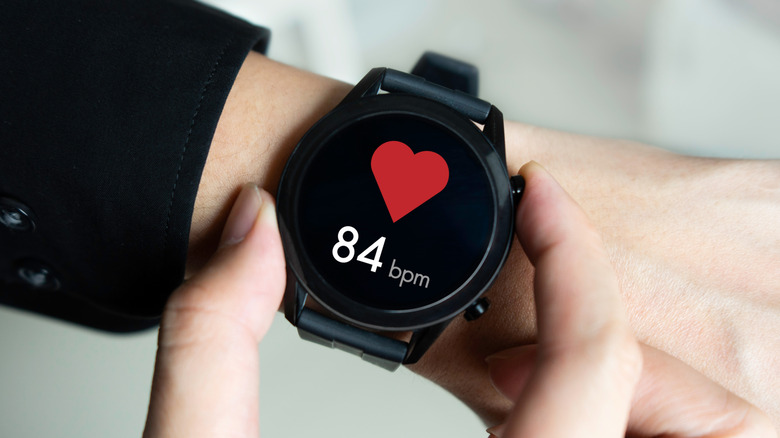Can Your Smartwatch Detect When Your Heart Is In Trouble?
Smartwatches are great for receiving information in an instant. Can that be beneficial as you look to monitor your health?
Usually, the heart pumps in time with electrical impulses that allow it to send blood to the rest of the body (via Cleveland Clinic). Atrial fibrillation (Afib) is an irregular heart rhythm — also known as an arrhythmia — that occurs when electrical impulses in the heart are disrupted. The following irregular impulses lead to improper blood pumping in the heart's chambers. Symptoms may not occur unless your heart is beating significantly faster than normal. When it does, however, you may feel palpitations, an irregular beating, flopping feelings, or chest pain. It can also cause symptoms, such as dizziness, fatigue, shortness of breath, and fainting. If untreated, Afib can lead to stroke or other life-threatening issues. It's also a common condition that leads to half a million people being hospitalized a year in the U.S.
Usually, it can be detected by a medical professional with a physical exam and several tests, including an electrocardiogram (EKG or ECG). According to the Washington Heart Rhythm Associates, a 12-lead EKG uses electrodes on 12 different areas of the body to read electrical impulses. Can smartwatches use their heart rate monitors to detect what would usually require an office visit?
Smartwatches can detect arrhythmias
According to Statista, the smartwatch market is expected to generate revenue of $53.6 billion by 2025. Many of these smartwatches already have the capability to monitor heart rate and potentially detect issues like Afib. Smartwatches utilize photoplethysmography, which uses light to monitor a wearer's pulse through the skin on their wrist (via American College of Cardiology).
A study presented at the American College of Cardiology's 71st Annual Scientific Session tested the accuracy of smartwatches' ability to detect Afib by monitoring 12,244 people over four years. Smartwatches with an Afib detecting app were worn and monitored by 12,244 people over four years. The 5,227 wearers whose watches indicated Afib then followed up and were tested by a clinician, with 93.8% being confirmed to have Afib.
A 2022 study published in the Canadian Journal of Cardiology also found that smartwatches with an Afib app can be used for detecting Afib. However, an ECG test and a reading by an electrophysiologist are much more accurate.
"The Apple Watch is a screening tool, not a diagnostic one," Dr. Andrew M. Freeman, a cardiologist in the Division of Cardiology and Department of Medicine at National Jewish Health, told Healthline. "The apps have gotten better, but they aren't there yet." His feelings and the 2022 study cast some doubt on the detecting capabilities of current smartwatches. While they can help detect heart rhythm abnormalities, they should be used as an extra precaution — not as a replacement for professional medical advice.


